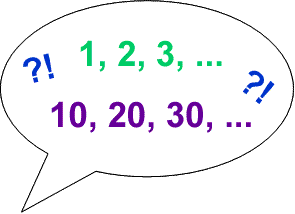Which Is Quicker?
Which is quicker, counting up to 30 in ones or counting up to 300 in tens? Why?
Problem
Which Is Quicker? printable sheet

Which is quicker, counting up to $30$ in ones or counting up to $300$ in tens? Why?
Which is quicker, counting up to $40$ in ones or counting up to $4,000$ in hundreds?
Which is quicker, counting up to $10$ in ones or counting up to $1,000,000$ in hundred-thousands?
Which is quicker, counting up to $20$ in ones or counting up to $140$ in sevens?
Which is quicker, counting up to $25$ in French or in English?
Maybe you could work on this with a partner!
When you have timed yourselves and decided on the reasons for your results, you could invent some other examples for yourselves.
You can predict which you think will be quicker, then try them out to test your prediction.
Getting Started
If you are trying to count in something unfamiliar such as hundred thousands it might be useful to write down and read the first two (or more) numbers in the list.
How will you make a prediction? What sorts of things do you need to take into account?
Student Solutions
Natasha from Moorfield Juniors has answered the first part of this problem. She says:
I thought it would take longer to count in $10$s to $300$ because the numbers were longer.
Idress from Al Ameen school in Dubai agrees with Natasha but adds that for the question of counting in sevens:
Urara and Andra from Canadian Academy in Japan sent in good ideas.
Urara and Andra wrote;
It all helps us to realise that when we are solving problems we have to keep our mind on what is happening as well as just looking at the numbers. A lot of folk did the arithmetic and said that there was no difference. They were looking at the difference in the number of numbers used. But of course the numbers were being said in counting and the people above worked on that idea. Well done!
Teachers' Resources
Why do this problem?
This problem could be used as a short one, suitable for the start of a lesson, but it could also be explored more fully and therefore take more time. It will help learners to come to a deeper understanding of how the number system works and can also be extended to cover various multiplication tables.
Possible approach
You could start by simply asking the whole class the question "Which is quicker, counting up to $30$ in ones or counting up to $300$ in tens?". Give pairs the chance to think together before discussing conclusions with the whole group. Encourage pupils to explain how they decided upon their answer, as well as the reasons. You could ask for volunteers to come up and do the counting so you can test out the class's predictions.
When they have done the suggested examples, learners could make up some of their own to work on and then try them out on others. You might want to place constraints on these, for example, can they find an example where they predict the two countings would take the same length of time?
At the end you could ask about their results and the factors that affected the speed at which they were able to count. It is likely that as well as mathematical reasons, there will be some practical considerations too, such as being very familiar with counting in some ways compared with others. As well as the number of numbers to say the length of the number words will also be significant: it will take longer to say $134$ than $34$.
Key questions
Possible extension
Learners could extend this to such things as counting tens of thousands, counting in $7$s from $70$ to $140$, counting in steps of $0.1$ from $0.1$ to $1$ or counting in fractions such as tenths or eighths.
Possible support
Some children may like to stick to counting in $10$s, $100$s, $2$ and $5$s, or other steps with which they they feel comfortable. Some learners may like to write down the numbers they are counting before being timed.

